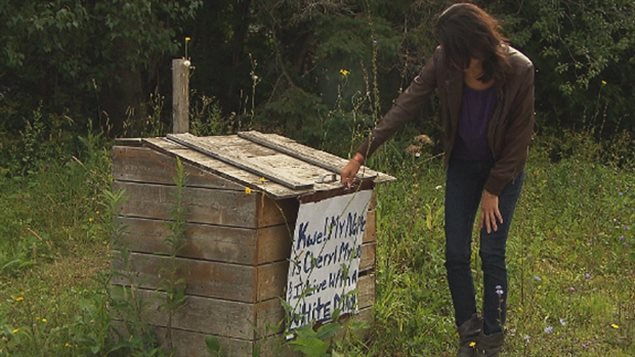Kahnawake, the native community across the river from Montreal, is the scene of heated discussion and anonymous action these days, as members argue over who has the right to live there.
Some people’s homes have been hit with eggs. Recently a group of community members held a rally supporting the law that will force non-native residents to leave the community by May of 2015.
Listen“Marry out, stay Out”
Cheryl Diabo has been living with her white boyfriend for five years in a home she inherited from her father, who received it from her great-uncle. Born and raised in Kahnawake, she doesn’t want to have to chose between her home and her relationship.
Diabo told CBC news that she took her case to the Longhouse – the traditional leadership in the Mohawk community, before she invited her boyfriend to move in with her
“I did ask them to discuss this matter because this is our jurisdiction, and I think now is the time more than ever to assert it. Families are being broken apart,” Diabo said.
Around their five-year anniversary, she had her partner sign a legal disclaimer, stating that he understood and respected Mohawk traditions. The letter, drafted by a lawyer, was signed by a Mohawk witness and was notarized.
For the majority of residents this is not enough. There is a lengthy history of disputes over residency at what is now known as Kahnawake, that goes back to the early days of contact in the 17th century. But this most recent conflict began In 1981, when the Band Council voted that non-native residents who marry someone from the community, must continue their life together outside it.
The law is known among the residents but has not been enforced until recently. In 2010, the Band Council Chiefs distributed letters reminding people of the law. It is estimated around 100 people would be affected in a community of 6,000.
Joe Delaronde, spokesperson for the 12-member Mohawk Council of Kahnewake said, ‘The laws were created so that we just wouldn’t be overwhelmed by the society at large’ He explained that in order to preserve the Mohawk language and way of life the council decided to stand by the rule.
There are so few of us… It’s a defense mechanism.
Former Federal Minister of Indian Affairs, Chuck Strahl, said of the dispute, “It is important for people to realize that whether I like the decisions or not, these are decisions made by First Nations people on their own land (…) It is not for me to make those decisions, or the Government, and we are not going to be making those decisions.”
Joe Delaronde concedes that for many years there was a double-standard at play. Native men could bring their non-native brides onto the reserve, where they were accorded all the rights of a native person in Canada. Native women, however, were forced to leave their communities to marry non-native men. This changed with the amendments to the Indian Act in 1985.
In February 2010, in an interview in the National Post newspaper, Ellen Gabriel, the head of Quebec Native Women and a Mohawk resident at the neighbouring community of Kanesatake, disagreed the Mohawk Council of Kahnawake. She said their actions ignored the traditional inclusiveness of Mohawk communities, which accepted and acculturated adoptees and marriage partners. Gabriel condemned the council for interfering in the private lives of persons who had chosen non-Native partners. The Mohawk had been successful at integrating people within their communities, and have preserved their language and culture over the centuries, according to Gabriel.
But only just. For Joe Delaronde, “it’s a defense mechanism”, one taken in order to continue to preserve the language and culture of the Mohawk people at Kahnawake







For reasons beyond our control, and for an undetermined period of time, our comment section is now closed. However, our social networks remain open to your contributions.